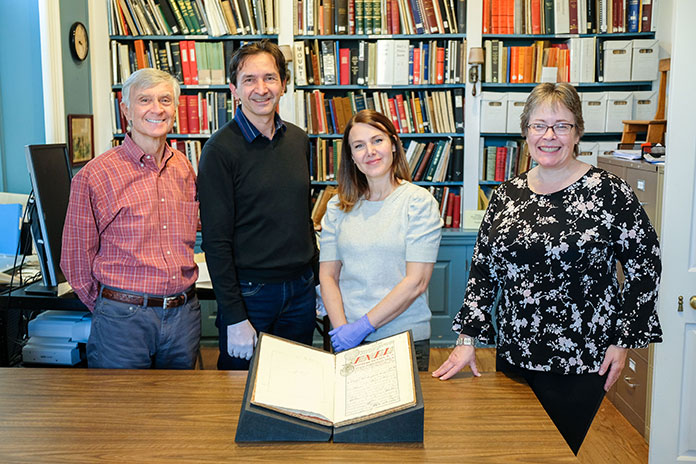
FREEHOLD – A valuable 18th century book discovered in the Monmouth County Historical Association (MCHA) archives and library was returned to its birth place in Mexico.
The book, “En El Nombre de Dios,” was found by historian and author Rick Geffken, who was conducting research at the MCHA archives and library in Freehold.
While searching through artifacts and papers of the Forman family, one of the oldest Monmouth County families, Geffken came across a protective cardboard envelope which seemed different compared to the other materials about the family. The envelope contained a 300-year-old hand-illustrated book written in old Spanish.
“In 1848, Lt. James W. Schureman, a West Point graduate from Shrewsbury, New Jersey was part of the occupying United State Army in Mexico City. The American military controlled the city after the Mexican-American War was concluded in February that year,” Geffken said. “About 170 years later, I was doing research at the MCHA in Freehold when I came across a 300-year-old hand-illustrated book written in old Spanish. It was in a protective cardboard envelope, seemingly out of context among the Forman papers. The Formans were one of the oldest Monmouth County families. Someone in the family had donated to the MCHA artifacts and papers, including this incredibly beautiful document.”
MCHA Research Librarian and Archivist Dana Howell later discovered that the book was written in 1715, notarized with an 1718-1719 stamp and contains guidelines for training Jesuit missionaries.
“The benefactor appears to be Jose de la Puente y Peña Castejón y Salcines (1663-1739), also known as the Marques de la Villapuente. In 1684, he served for eight years as a soldier in the Windward Navy, created to defend Spain’s territories from pirates, privateers, and enemy attacks by European conquerors. In 1692, he came to the defense of the Viceroyalty Palace in Mexico City, in which he put down an attack by Indians, and in which he is credited with preventing a greater disaster. In 1695, he became captain of the Militia Infantry of a company in the Third Militia. King Carlos II knighted him in the Order of Santiago (1696) and in 1700 he became Ordinary Mayor of Mexico. It was said that his first order of business was to fund a water tank for the city with 2,000 pesos out of his own pocket. He went on to become Master of Field of the Royal Armies, and a gentleman of His Majesty King Philip V’s bed chamber. Interestingly, he was offered the Viceroyalty of New Spain by Philip V, but he rejected the appointment. The Marques’ contributions to the defense of New Spain were so appreciated by the king that, despite his rejection of grants and appointments, the king bestowed much upon him regardless. Villapuente became incredibly rich, and began dedicating his life to the support of missionary work,” Howell stated.
In addition, Howell explained how the foundation in the book was supported by 10,000 pesos, and its purposed seemed to be for training Jesuit missionaries, listing laws and rules.
Both Geffken and Howell believe Lt. Schureman came into possession of the book while stationed in Mexico City and brought it back to Shrewsbury.
Bernadette Rogoff, the MCHA’s Director of Collections, agreed that the book should be returned to Mexico. After months of consulting, members of the MCHA met up with Miguel Gleason, Executive Director of the Mexican Cultural Institute in New York, to transfer the book and return it back to Mexico. Gleason will be bringing “En El Nombre de Dios” back to its rightful owners.






